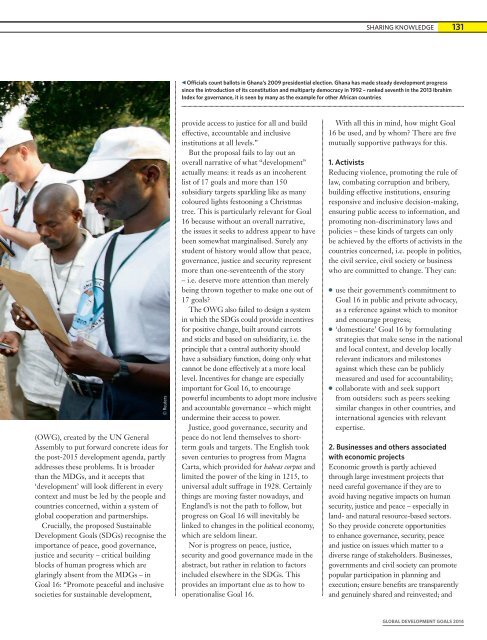FAMBB
FAMBB
FAMBB
You also want an ePaper? Increase the reach of your titles
YUMPU automatically turns print PDFs into web optimized ePapers that Google loves.
SHARING KNOWLEDGE131Officials count ballots in Ghana’s 2009 presidential election. Ghana has made steady development progresssince the introduction of its constitution and multiparty democracy in 1992 – ranked seventh in the 2013 IbrahimIndex for governance, it is seen by many as the example for other African countries© Reuters(OWG), created by the UN GeneralAssembly to put forward concrete ideas forthe post-2015 development agenda, partlyaddresses these problems. It is broaderthan the MDGs, and it accepts that‘development’ will look different in everycontext and must be led by the people andcountries concerned, within a system ofglobal cooperation and partnerships.Crucially, the proposed SustainableDevelopment Goals (SDGs) recognise theimportance of peace, good governance,justice and security – critical buildingblocks of human progress which areglaringly absent from the MDGs – inGoal 16: “Promote peaceful and inclusivesocieties for sustainable development,provide access to justice for all and buildeffective, accountable and inclusiveinstitutions at all levels.”But the proposal fails to lay out anoverall narrative of what “development”actually means: it reads as an incoherentlist of 17 goals and more than 150subsidiary targets sparkling like as manycoloured lights festooning a Christmastree. This is particularly relevant for Goal16 because without an overall narrative,the issues it seeks to address appear to havebeen somewhat marginalised. Surely anystudent of history would allow that peace,governance, justice and security representmore than one-seventeenth of the story– i.e. deserve more attention than merelybeing thrown together to make one out of17 goals?The OWG also failed to design a systemin which the SDGs could provide incentivesfor positive change, built around carrotsand sticks and based on subsidiarity, i.e. theprinciple that a central authority shouldhave a subsidiary function, doing only whatcannot be done effectively at a more locallevel. Incentives for change are especiallyimportant for Goal 16, to encouragepowerful incumbents to adopt more inclusiveand accountable governance – which mightundermine their access to power.Justice, good governance, security andpeace do not lend themselves to shorttermgoals and targets. The English tookseven centuries to progress from MagnaCarta, which provided for habeas corpus andlimited the power of the king in 1215, touniversal adult suffrage in 1928. Certainlythings are moving faster nowadays, andEngland’s is not the path to follow, butprogress on Goal 16 will inevitably belinked to changes in the political economy,which are seldom linear.Nor is progress on peace, justice,security and good governance made in theabstract, but rather in relation to factorsincluded elsewhere in the SDGs. Thisprovides an important clue as to how tooperationalise Goal 16.With all this in mind, how might Goal16 be used, and by whom? There are fivemutually supportive pathways for this.1. ActivistsReducing violence, promoting the rule oflaw, combating corruption and bribery,building effective institutions, ensuringresponsive and inclusive decision-making,ensuring public access to information, andpromoting non-discriminatory laws andpolicies – these kinds of targets can onlybe achieved by the efforts of activists in thecountries concerned, i.e. people in politics,the civil service, civil society or businesswho are committed to change. They can:●●use their government’s commitment toGoal 16 in public and private advocacy,as a reference against which to monitorand encourage progress;● ● ‘domesticate’ Goal 16 by formulatingstrategies that make sense in the nationaland local context, and develop locallyrelevant indicators and milestonesagainst which these can be publiclymeasured and used for accountability;●●collaborate with and seek supportfrom outsiders: such as peers seekingsimilar changes in other countries, andinternational agencies with relevantexpertise.2. Businesses and others associatedwith economic projectsEconomic growth is partly achievedthrough large investment projects thatneed careful governance if they are toavoid having negative impacts on humansecurity, justice and peace – especially inland- and natural resource-based sectors.So they provide concrete opportunitiesto enhance governance, security, peaceand justice on issues which matter to adiverse range of stakeholders. Businesses,governments and civil society can promotepopular participation in planning andexecution; ensure benefits are transparentlyand genuinely shared and reinvested; andGLOBAL DEVELOPMENT GOALS 2014


